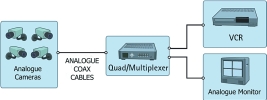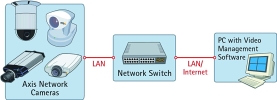
Video surveillance systems have existed for some 25 years, starting out as 100% analog systems and gradually becoming digitised. Today’s systems have come a long way from the early analog tube cameras connected to a VCR. They now use network cameras and PC servers for video recording in a fully digitised system.
However, in between the fully analog and the fully digital systems, there are several solutions which are partly digital; these solutions include a number of digital components but do not represent fully digital systems. All systems described in the second and third sections below constitute partly `digital video systems'; only the systems described in the last two sections are true network video systems, in which the video is purely transported over an IP network, and which are fully scalable and flexible.
Analog CCTV systems using VCR
An analog CCTV system using a VCR (video cassette recorder) represents a fully analog system consisting of analog cameras with coax output, connected to the VCR for recording. The VCR uses the same type of cassettes as a home VCR. The video is not compressed, and, if recording at full frame rate, one tape lasts a maximum of 8 hours. In larger systems, a quad or multiplexer can be connected in between the camera and the VCR. The quad/multiplexer makes it possible to record several cameras to one VCR, but at the cost of a lower frame rate. To monitor the video, an analog monitor is used.

Analog CCTV systems using DVR
An analog CCTV system using a DVR (digital video recorder) is an analog system with digital recording. In a DVR, the videotape is replaced with hard drives for the video recording, which requires the video to be digitised and compressed in order to store as many day's worth of video as possible. With early DVRs, hard disk space was limited - so recording duration was limited, or a lower frame rate had to be used. Recent development of hard disks means space is no longer a major problem. Most DVRs have several video inputs, typically 4, 9, or 16, which means they also include the functionality of the quad and multiplexers.
The DVR system has the following advantages:
* No need to change tapes.
* Consistent image quality.

Analog CCTV systems using network DVR
An analog CCTV system using a network DVR is a partly digital system that includes a network DVR equipped with an Ethernet port for network connectivity. Since the video is digitised and compressed in the DVR, it can be transported over a computer network to be monitored on a PC in a remote location. Some systems can monitor both live and recorded video, while some can only monitor recorded. Furthermore, some systems require a special Windows client to monitor the video, while others use a standard web browser; the latter making the remote monitoring more flexible.
The network DVR system has the following advantages:
* Remote monitoring of video via a PC.
* Remote operation of the system.

Network video systems using video servers
A network video system using video servers includes a video server, a network switch and a PC with video management software. The analog camera connects to the video server, which digitises and compresses the video. The video server then connects to a network and transports the video via a network switch to a PC, where it is stored on hard disks. This is a true network video system.
A network video system using video servers has the following advantages:
* Use of standard network and PC server hardware for video recording and management.
* The system is scalable in steps of one camera at a time.
* Off-site recording is possible.
* It is future-proof since the system can easily be expanded by incorporating network cameras.

Network video systems using network cameras
A network camera combines a camera and computer in one unit, which includes the digitisation and compression of the video, as well as a network connector. The video is transported over an IP-based network, via network switches, and recorded to a standard PC with video management software. This represents a true network video system and is also a fully digital system, where no analogue components are used.
A network video system using network cameras has the following advantages:
* High resolution cameras (megapixel).
* Consistent image quality.
* Power over Ethernet and wireless functionality.
* Pan/tilt/zoom, audio, digital inputs and outputs over IP along with video.
* Full flexibility and scalability.

In the next part in this series we will look at image generation and compression standards.
For more information contact Roy Alves, Axis Africa, 011 548 6780, [email protected]

© Technews Publishing (Pty) Ltd. | All Rights Reserved.